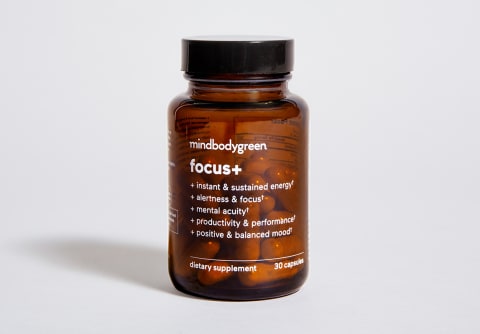Advertisement
Let's Look At The Science: How Long Does Caffeine Stay In Our System?


Ashley Jordan Ferira, Ph.D., RDN is Vice President of Scientific Affairs at mindbodygreen. She received her bachelor's degree in Biological Basis of Behavior from the University of Pennsylvania and Ph.D. in Foods and Nutrition from the University of Georgia.
If you aren't a part of coffee culture, you're at least aware of it. So it shouldn't come as a surprise that caffeine is the most widely used phytonutrient compound for promoting energy in the world.
Coffee powers our days—and sometimes, even nights. Even the thought of coffee motivates me to get out of bed most mornings! According to a 2014 review from Food and Chemical Toxicology, approximately 85% of the U.S. population1 consumes at least one caffeinated beverage a day, so it's no overstatement to say that America runs on the stuff. But with all of this talk about caffeine keeping us awake, you can't help but wonder what it's doing to your sleep hygiene.
"Caffeine is an energy phytonutrient compound which blocks adenosine receptors. Adenosine is a sleep-promoting chemical in the brain that builds up throughout the day, resulting in us feeling sleepy as the day goes on," says Julia Kogan, Ph.D., health psychologist and stress and sleep coach. With caffeine affecting the way in which our system regulates sleepiness, there's little doubt that caffeine (when not used wisely) can affect our sleep health.
This energizing phytonutrient and antioxidant is found in coffee and tea but also in things like chocolate, soda, and even some nootropic supplements. Understanding how caffeine affects your body is essential to reaping the benefits of this long-used phytochemical2 and avoiding the less desirable side effects, like suboptimal sleep.
Understanding caffeine's half-life.
Caffeine stays in your system for longer than you may think. The half-life of caffeine—i.e., the amount of time it takes for the body to process just half—is usually around five hours but can vary from one to as much as nine hours, says Meredith Broderick, M.D., neurologist and sleep specialist.
Most caffeine (i.e., the instant-release stuff) is fully absorbed 45 minutes after being ingested but doesn't leave the body for a while. According to Kogan, the full metabolism of caffeine can take up to 10 hours.
The less common, extended varieties of caffeine intentionally prolong the release of caffeine3 over time, sustaining its levels in the blood and its benefits while buffering against the dreaded "crash" phenomenon. This also means you would want to take it earlier in the day so the energizing effects don't bleed into your nighttime ritual.
As you can imagine, not everyone metabolizes caffeine the same, which results in discrepancies between individual experiences. Caffeine sensitivity depends on age, sex, genetic makeup, and environmental factors (e.g., whether the person smokes or is pregnant), shares Broderick.
As mentioned, your genes have a profound effect on your sensitivity to caffeine, too. "Variations in the CYP1A2 and AHR genes have been shown to affect how quickly the body metabolizes caffeine. Research has also shown that people with a variation in their ADORA2A gene experience stronger caffeine effects and for longer periods of time," Kogan notes.
A classic 8-ounce cup of black coffee contains about 96 milligrams4 of caffeine. But honestly, most of us are more likely to reach for 16 ounces of brewed coffee or cold brew, which have double the caffeine content. A 2018 review states that the average American adult consumes about 200 milligrams5 of caffeine every day, confirming this hypothesis.
Navigating caffeine sensitivity.
For those who are more sensitive to caffeine, some experts recommend microdosing the compound—i.e., intentionally consuming small amounts of caffeine throughout the day to reduce the less pleasant side effects of increased caffeine intake those sensitive individuals may experience. You can also combine your coffee with a source of fat like coconut oil to help with digestion.
If you are drinking coffee strictly for its energizing effects, you may even consider replacing one of your cups with a high-quality supplement that contains plant-derived caffeine (i.e., from the coffee plant!), like mbg's focus+. Someone who usually has three cups of coffee a day might just need two, for example, after taking this supplement.
focus+ supplies 150 milligrams of caffeine per capsule, straight from the Coffea robusta and Coffea arabica species of the coffee plant. This includes 50 milligrams of caffeine instantly released into your system via antioxidant-rich whole coffee fruit, as well as 100 milligrams of sustained-release caffeine (Xtenergy) delivered throughout the day via green coffee beans.*
According to Deshanie Rai, Ph.D., FACN, the vice president of OmniActive Scientific & Regulatory Affairs, "Leveraging patented technology, Xtenergy from green coffee beans is clinically shown to sustain caffeine release in the body3—extending its nootropic benefits and buffering against the infamous 'crash' phenomenon."* In other words, this thoughtfully delivered caffeine has been clinically shown to increase alertness, relaxation, and overall mood, while simultaneously combating jitteriness, tenseness, and tiredness.* (Talk about useful plant bioactive technology).
This focus-enhancing supplement also contains L-theanine, which is the amino acid responsible for the calm, focused state often felt with matcha.* And while the benefits are the same as the green-tea-famous bioactive, the concentrated dose of L-theanine found in focus+ is intentionally derived via a pure, patented fermentation process. (It also happens to be the most clinically researched type of L-theanine, aka Suntheanine®).
Caffeine and sleep.
There's no question that caffeine can affect sleep. A 2017 review6 shows that caffeine can affect everything from sleep latency (the time it takes to fall asleep) to time spent in deep sleep, if taken at the wrong time. "When caffeine is consumed too close to bedtime, this can interfere with the circadian rhythm (the body's 24-hour schedule that regulates when we sleep). Caffeine too close to bedtime has also been shown to reduce the total time of slow-wave deep sleep, which is responsible for helping us to feel energized and well rested in the morning," shares Kogan.
So, when should you stop drinking caffeine during the day? "Research from the Journal of Sleep Medicine7 indicates that a general guideline for most individuals is to cut off caffeine intake at least six hours before bed," says Kogan. For the extended-delivery varieties of caffeine, you might consider backing that cutoff time further. Caffeine timing is ultimately a personalized decision.
Indeed, with such variation in how people metabolize caffeine, Kogan advises personal trial and error to find the best time to cut off their intake. For example, those who are especially sensitive to caffeine should limit their use to the morning. Plus, it's important to remember the other foods and drinks that contain caffeine (like chocolate and soda) to ensure you're really going caffeine-free when you intend to.
How to get caffeine out of your system.
The truth is that there aren't many ways to accelerate your body's processing of caffeine. "One study showed exercise may shorten the half-life of caffeine8, but more research is needed. Physical activity can also be helpful in coping with jitters and feelings of anxiousness related to too much caffeine," says Kogan. Some research has also suggested that eating broccoli, or other cruciferous vegetables, may help metabolize caffeine.
Kogan also shares that even though there aren't many ways to speed up caffeine metabolism, some things can be helpful in avoiding unpleasant side effects, like increasing water intake. Because caffeine has diuretic effects, drinking adequate amounts of water is vital to feeling good while consuming caffeine.
She recommends eating well-balanced and fiber-rich meals before consuming caffeine, too, to slow the absorption, leading to fewer side effects related to too much caffeine intake.
Signs you've had too much caffeine.
If you've ever tried to go a few days without your habitual morning latte, you may be familiar with the unpleasant effects of eliminating caffeine from your everyday routine. These side effects can include feelings of tiredness, decreased alertness, difficulty concentrating, and even irritability.
Strangely, these sound a lot like the things we all try to avoid by consuming caffeine in the first place, which can get us into a whole mess. For some more sensitive folks, consuming even as little caffeine as just a daily cup of coffee can cause these effects9 when it's skipped. Talk about a vicious cycle!
The takeaway.
So, caffeine is used to combat feelings of sleepiness but in itself can lead to suboptimal sleep, which might lead you to reach for more caffeine to combat those tired feelings. No wonder we're all stuck in coffee's grip!
If you're looking to end the cycle, experts agree that having a strict cutoff time for your last cup of coffee or tea (approximately six hours before you go to bed), and being mindful of other caffeinated foods and supplements you might be consuming is key.
Maybe even skip the midday coffee for an herbal tea. Alternatively, a supplement with sustained-release caffeine—like mbg's focus+—may be the key to eliminating that caffeine crash (and the need for that afternoon coffee) entirely.*
9 Sources
- https://www.sciencedirect.com/science/article/pii/S0278691513007175#:~:text=Results%20showed%20that%2085%25%20of,%C2%B1%202%20mg%2Fday).
- https://www.mdpi.com/2072-6643/14/9/1712/htm
- https://www.sciencedirect.com/science/article/pii/S2666518221000231
- https://fdc.nal.usda.gov/fdc-app.html#/food-details/1104137/nutrients
- https://www.ncbi.nlm.nih.gov/pmc/articles/PMC6292246/#b1-rmhp-11-263
- https://pubmed.ncbi.nlm.nih.gov/26899133/
- https://www.ncbi.nlm.nih.gov/pmc/articles/PMC3805807/#:~:text=Conclusion%3A,6%20hours%20prior%20to%20bedtime.
- https://pubmed.ncbi.nlm.nih.gov/2060565/#:~:text=Exercise%20raised%20the%20maximal%20plasma,l%3A%20E%2020.9%20l).
- https://www.ncbi.nlm.nih.gov/books/NBK430790/
Watch Next
Enjoy some of our favorite clips from classes
Enjoy some of our favorite clips from classes
What Is Meditation?
Mindfulness/Spirituality | Light Watkins
Box Breathing
Mindfulness/Spirituality | Gwen Dittmar
What Breathwork Can Address
Mindfulness/Spirituality | Gwen Dittmar
The 8 Limbs of Yoga - What is Asana?
Yoga | Caley Alyssa
Two Standing Postures to Open Up Tight Hips
Yoga | Caley Alyssa
How Plants Can Optimize Athletic Performance
Nutrition | Rich Roll
What to Eat Before a Workout
Nutrition | Rich Roll
How Ayurveda Helps Us Navigate Modern Life
Nutrition | Sahara Rose
Messages About Love & Relationships
Love & Relationships | Esther Perel
Love Languages
Love & Relationships | Esther Perel
What Is Meditation?
Box Breathing
What Breathwork Can Address
The 8 Limbs of Yoga - What is Asana?
Two Standing Postures to Open Up Tight Hips
How Plants Can Optimize Athletic Performance
What to Eat Before a Workout
How Ayurveda Helps Us Navigate Modern Life
Messages About Love & Relationships
Love Languages
Advertisement

This Little-Known Supplement Helps Women Sleep & Decreases Signs Of Depression
Molly Knudsen, M.S., RDN

This Little-Known Supplement Helps Women Sleep & Decreases Signs Of Depression
Molly Knudsen, M.S., RDN
















